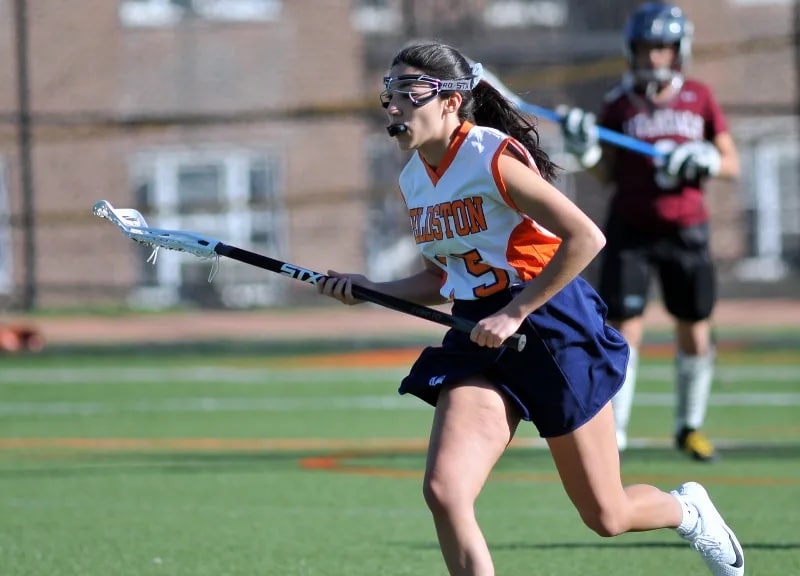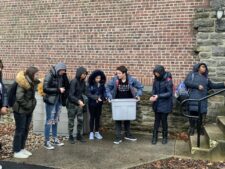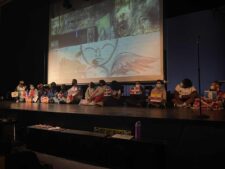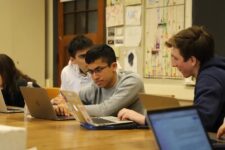When the Ethical Culture Fieldston School closed its campuses in March, there were plenty of unknowns. For the 241 Fieldston Upper student athletes, there remained the question of what would happen to the rest of their spring season. Baseball, softball, track, lacrosse, boys tennis, golf, and ultimate Frisbee had only held three weeks of in-person practice — a few teams had already played games and scrimmages against other schools — when their world suddenly changed and everything came to a grinding halt.
Students and coaches — along with the rest of the ECFS community — were confused, frightened, and saddened by the new reality created by the global pandemic. But instead of canceling the spring season, teams chose to move their practices online and developed innovative and exciting ways to stay active, motivated, and — most important — connected.
“The baseball coaches and Fieldston kids know: We don’t look at adversity as a negative. We look at it as an opportunity,” says Tony Marro, Form V Dean and Head Baseball Coach. “It was a sad time. It was so new and so odd — we just needed a place to see each other’s faces.”
The athletes agree. “I think quarantine was a pretty lonely experience for everyone, so having a time to come together every day with the team was something everyone looked forward to and enjoyed,” says Ryan ’22. (Click here to read student reflections of this season.) “It gave a sense of normalcy to something that was anything other than normal.”
The spring served as a template for the fall 2020 semester, when hyflex learning means a very different sports season.
For varsity baseball, holding practice every day was more about supporting one another than about honing the players’ skills in the sport. “I’m not breaking down a baseball swing on the computer — they would have laughed at me,” says Marro. However, the practices did involve physical training: Students led weekly workout sessions for one another on Google Meet, amplifying the intensity with drills and competitions over who could do the most push-ups.
Students appreciated the time they spent together as a welcome break from an increasingly confusing and frightening world. “Baseball has always been my way of getting my mind off school work and stress,” says Ben B. ’21.
“Even though we weren’t actually playing baseball, the virtual practices helped me to connect with the team and distract myself for the hour we were in the meetings.”
Holding practices virtually also opened up unexpected opportunities for the team. Every Tuesday, students and coaches from every baseball team in the Ivy Preparatory School League gathered virtually for Q&A sessions with notable alumni from around the country, including Will Savage ’13, who was drafted to the Detroit Tigers and played for the Toronto Blue Jays. Harrison Bader, current center fielder for the St. Louis Cardinals and Horace Mann alum, also joined one week. Students were able to ask the players questions about their lives and careers, and special time was given to the Form VI players to meet in smaller groups with the alumni.
“These virtual practices were incredibly helpful,” says Declan S. ’23. “They inspired me, and I was able to watch some of my favorite MLB players while improving my baseball IQ.”
The coaching team did its best to create a space for the students that was safe and supportive. Practices were all voluntary so that any student who felt overwhelmed by work or their personal life didn’t feel obligated to attend. “I leaned more towards relationship-building than practicing baseball on the computer,” says Marro. “I wanted to give them a place to hang out, to make some jokes, to connect with one another.”
GloriAnne DiToro, ECFS Athletics Coordinator and Head Coach for Girls Lacrosse, is using her experience coaching a season of virtual lacrosse in the spring to help plan for fall 2020, when athletics will begin in a remote setting and transition gradually to in-person practices starting in October.
When the girls lacrosse season switched to virtual practice in the spring, DiToro knew she needed to reevaluate the team’s goals for their season. “These teams become families when they see each other every day and invest in the same hopeful outcome — winning,” she says. “Without any games to compete in, the mindset for the team needed to change.”
The team’s focus switched from competition to camaraderie and compassion. For the first few virtual meetings, DiToro gave the students space to speak their minds — but the team was cautious and hesitant to contribute. There was a shared sense of fear and confusion, with so much unknown about their future.
So DiToro turned to activities she hoped would keep the players engaged and bring them some joy: She invited students to take turns each week leading group workouts. She invited lacrosse team alumni to join and speak to the team — especially as empathetic college lacrosse players who were experiencing the same confusion and disappointment from a lost season as the ECFS team. The team challenged girls softball to a game of virtual Pictionary. Each week, the practices grew louder, filled with the sounds of music and laughter.
“I turn to the lacrosse team for a sense of community and support,” says Cameron K. ’21, one of the team captains. “While our season last spring was anything but normal, knowing that I had a home on the team among over 20 amazing members helped soothe my anxiety around the uncertainty of COVID-19.”
And all was certainly not lost when the season went online. “Virtual lacrosse made me feel a part of my team, allowed me to form a relationship with my coaches, and gave me new friendship opportunities,” says Jordan N. ’23, who joined the lacrosse team in the spring as a freshman.
In a time as volatile and challenging as the spring, creating a supportive atmosphere for students was incredibly valuable, and players appreciated the opportunity to share this space together. And the practices came with other benefits, too: “Staying active and looking forward to practice was really helpful for both my physical and mental health,” says Sophia H. ’22.
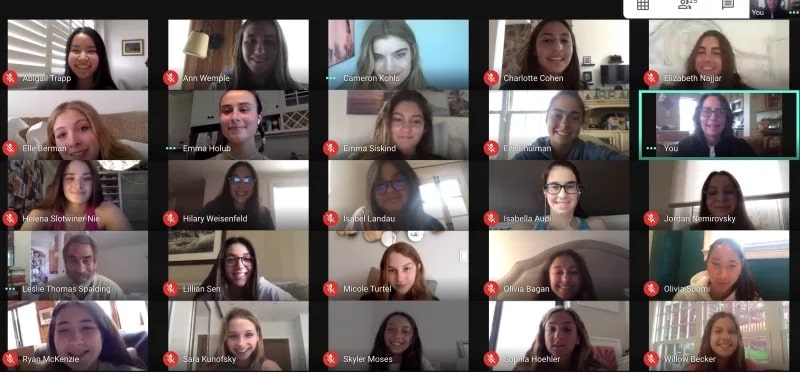
Even when they were tired or stressed, the players knew how special these virtual practices were. “Some practices, we were collectively more energetic and wanting to engage. Other days, we were exhausted, annoyed, and preferred to be silent,” says Vale M. ’21. “Either way, we showed up, and, in the context of what was occurring in each of our lives, I think that was a success and a constant reminder that you had a community to call upon if you needed or wanted.”
All of the coaches at ECFS are excited to welcome students back to in-person practices starting in October. While on campus, students will be able to enjoy the newly outfitted and updated fitness center — a transformation made possible by a generous donor who wanted to show support for ECFS’s Athletics program and, in particular, honor Director of Athletics Gus Ornstein ’94, whose leadership has inspired and motivated our student athletes for more than sixteen years.
The fall athletics season will probably not include any games, but DiToro and the other coaches know that there are other ways to build strength as a team. “We have outstanding and experienced coaches who will create an environment that gives players a reason to put forth strong effort, a reason to maintain and build strong support between students, even if they don’t end up playing in games together,” she says.
